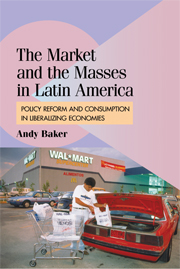Book contents
- Frontmatter
- Contents
- Figures and Tables
- Acknowledgments
- The Market and the Masses in Latin America
- Part I Introduction and Theory
- Part II Mass Beliefs about Market Policies in Latin America
- Part III Mass Support for Reform in Brazil
- 6 THE ECONOMIC CONSEQUENCES AND ELITE RHETORIC OF MARKET REFORM IN BRAZIL
- 7 HOW MANY BRAZILIANS SUPPORT MARKET REFORMS?
- 8 WHICH BRAZILIANS SUPPORT MARKET REFORMS?
- Part IV Conclusion
- Survey Data Appendix
- References
- Index
- Titles in the series
6 - THE ECONOMIC CONSEQUENCES AND ELITE RHETORIC OF MARKET REFORM IN BRAZIL
Published online by Cambridge University Press: 22 August 2009
- Frontmatter
- Contents
- Figures and Tables
- Acknowledgments
- The Market and the Masses in Latin America
- Part I Introduction and Theory
- Part II Mass Beliefs about Market Policies in Latin America
- Part III Mass Support for Reform in Brazil
- 6 THE ECONOMIC CONSEQUENCES AND ELITE RHETORIC OF MARKET REFORM IN BRAZIL
- 7 HOW MANY BRAZILIANS SUPPORT MARKET REFORMS?
- 8 WHICH BRAZILIANS SUPPORT MARKET REFORMS?
- Part IV Conclusion
- Survey Data Appendix
- References
- Index
- Titles in the series
Summary
When the Workers Party was born, it was a tiny baby. It grew up, became a teenager, then an adult, then it got married, and with marriage came the responsibility of governing.
– Luiz Inácio Lula da Silva, as Brazilian president in 2005 (Branford et al. 2003, 10)The three chapters of Part III focus on a single country: Brazil. The case study conducted in these chapters parallels the regionwide analysis conducted in the preceding three chapters. Chapter 6 summarizes the relevant economic consequences and elite rhetoric of reform in Brazil, Chapter 7 describes the sources of aggregate support for market policies, and Chapter 8 analyzes the determinants of individual-level variation in mass beliefs. These chapters, however, do not merely repeat the analyses and findings of Chapters 3 through 5 for the Brazilian case. Although they use some of the same data sources and methods of analysis, I advance the overall argument by presenting different, and typically more precise, forms of evidence. In particular, I provide even more convincing evidence for the consumption- and elite-based explanations by describing (1) Brazilians' rationales, provided in open-ended survey questions, for their beliefs about market reforms, (2) Brazilians' beliefs about how market policies have affected consumption- and labor-market criteria, (3) the impact of consumer tastes, as captured by precise and varied measures of consumption behavior, and (4) the nature of elite opinion, as measured not only by surveys of legislators but also by the volume of media coverage and the specific pronouncements of various presidents.
- Type
- Chapter
- Information
- The Market and the Masses in Latin AmericaPolicy Reform and Consumption in Liberalizing Economies, pp. 171 - 190Publisher: Cambridge University PressPrint publication year: 2009



